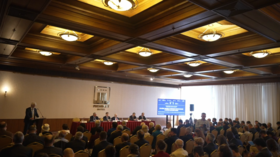Berkeley suspends Palestine class midway through semester

A University of California, Berkeley class, ‘Palestine: A Settler-Colonial Analysis’, was suspended after Chancellor Nicholas Dirks determined that the student teaching the course had not followed the appropriate procedures for its approval.
The one-credit student-taught class has become the center of a bitter debate. The class was meant to teach the history of Palestine “from the 1880s to the present, through the lens of settler colonialism,” its syllabus once read, according to the San Francisco Chronicle. The syllabus has since been removed.
The class was a part of Berkeley’s DeCal program, or Democratic Education at Cal. The premise is not revolutionary; students teach one-credit classes to other students on a pass/fail basis.
#California lawmakers move to ban companies from boycotting #Israelhttps://t.co/9xaz4ilV51pic.twitter.com/vE3EFRY7Fl
— RT America (@RT_America) September 3, 2016
Some of these classes offer challenging topics like professional speaking, cryptocurrency and faith-based debates. Other classes are more fun, like ones about Korean drumming, introduction to baking and meditation classes.
However, the class on Palestine’s history was removed after Chancellor Dirks received a letter from 43 Jewish and civil rights groups that claimed the class was acting as political indoctrination that encouraged students “to hate the Jewish state and take action to eliminate it.”
The letter published on Tuesday accused both the student, Paul Hadweh, and the faculty advisor, Hatem Bazian, of having “extreme anti-Zionist political orientation.” Hadweh is a member of the school’s Students for Justice in Palestine, and Bazian is the chairman of American Muslims for Palestine (AMP).
The letter points out that the class is the only politically motivated DeCal class and claimed that much of the assigned course reading is from authors who have either called for an academic boycott of Israel, called for the dismantling of Israel, or both.
However, the letter did not call for a suspension of the class. Rather, it wanted a stricter policy that would prevent future classes from not meeting requirements from the Regents Policy on Course Content.
The Board of Regents stance on student led courses does ban “misuse of the classroom by, for example, allowing it to be used for political indoctrination.” The problem is that political indoctrination is given no definition, leaving it open ended for potentially any politically charged course to potentially be against its policies.
As a result, Dirks’ office responded by telling the groups that the class “did not receive a sufficient degree of scrutiny to ensure that the syllabus met Berkeley’s academic standards,” according to the Chronicle.
Dirks spokesman claimed that Hadweh “did not comply with policies and procedures that govern the normal academic review.” He explained that Hadweh’s syllabus had not been seen or approved by the dean of the College of Letters and Sciences.
NY governor signs pro-Israel executive order to ‘blacklist’ supporters of Israel boycotthttps://t.co/H1ryyNq7O7pic.twitter.com/XSYwc7aAKw
— RT America (@RT_America) June 6, 2016
Hadweh gave a statement to Academe Blog, saying:
“I complied with all policies and procedures required for creating the course. The course was vetted and fully supported by the faculty advisor, the department chair, and the Academic Senate’s Committee on Courses of Instruction (COCI).
The university suspended the course without consulting me, the faculty sponsor, the chair of the department, or the Academic Senate’s COCI, which is responsible for approving all UC Berkeley Courses. The university did not contact us to discuss concerns prior to suspending our course.”
The Dean of Berkeley’s College of Letters and Science, Carla Hesse, first contacted Hadweh to inform him that the course had been suspended on September 14, according to Academe Blog.
Statements from the school placed the blame for the suspension squarely on Hadweh’s shoulders.
Dan Mogulof, executive director for communications and public affairs at Berkeley, told InsideHigherEd, “Although the dean is not required to approve the course, students must still send her a copy of the proposal,” and said that Hesse was surprised to learn about the class, as she had never received a syllabus.
However, when Academe Blog realized that the website for the DeCal procedure does not require the Dean of Letters & Science to receive a copy of the syllabus, Mogulof changed his story.
He wrote, “The existing policy of the Academic Senate’s Committee on Courses and Instruction explicitly states that the relevant department chair or the Dean must approve new courses, and that ‘a copy of the approved proposal form” must also be provided to the Dean. Neither of these steps were completed in this instance.”
On Tuesday, Hadweh was told by Hesse that he had to do three things to potentially have the class restored, Academe Blog reported. First he was to prove that the class was “fair and balanced.” Second, he was banned from “seeking to politically mobilize students” through the course, and third, he was to defend why the class about Palestine would be considered Ethnic Studies and not Near East Studies or Global Studies.
Meanwhile, the following classes remain available: ‘Marxism and Its Discontents, Addressing Inequality through Urban Debate’ and ‘Rethinking The Drug War: Historical Context, Framing, and Education’.













